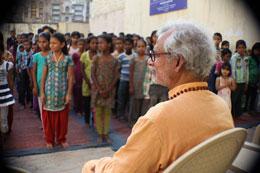Gospel for Asia denies Canadian fraud charges

A massive missionary organisation that focuses on India, particularly Kerala, faces accusations in Canada of misusing millions of dollars in charitable donations while a class-action lawsuit, with a similar premise, has been filed against it in the US.
Gospel for Asia (GFA), with its headquarters in Wills Point, Texas, was founded by Kerala-born Yohannan Kadippiaril Punnose in 1978. Since then, it has burgeoned with branches in countries like the US, Canada, Australia, South Korea, Finland and others, reported the Hindustan Times.
Complaints against the evangelical group’s functioning have multiplied in North America. Among the complainants is Bruce Morrison, pastor of the Christian Fellowship Church of New Glasgow in the Canadian province of Nova Scotia.
Morrison has prepared a 21-page financial analysis, alleging as much as $128 million in global donations received by GFA during 2007-14 had gone “missing”, The Hamilton Spectator newspaper reported. The report alleged GFA was “using donations to build a massive for-profit corporate empire”.
GFA’s filings with the Canada Revenue Agency (CRA) show $93.5 million was transferred to India during 2007-14, but “Indian government documents show that no money from Canada was received by the charity’s Indian affiliates during the same period”, the report said.
Morrison, who has filed complaints with the CRA and the Royal Canadian Mounted Police (RCMP), told Hindustan Times, “They received money for one purpose and spent it for another. I wrote several letters to them (GFA), but never really got good answers.”
Another complaint has gone to CRA’s Charities Directorate from Garry Cluley, a former board member of GFA Canada, who stated in a letter it was his belief that “a full investigation into financial and other practices by GFA is needed”.
The CRA does not comment on individual cases and the RCMP refrains from comments unless charges are filed in a case.
GFA’s Hamilton, Ontario-based Canadian operations head Pat Emerick responded in an email: “The accusations are not true, even absurd, and we’ve communicated that clearly.”
Emerick also told the Spectator “all proper reporting has been done according to Indian law” and that GFA has “complied with all Canadian law for charities, and funds sent to the field have been accounted for”. He dismissed Morrison’s allegations as “based upon conspiracy theories (that) do not – by any means – reflect reality”.
Yohannan met Prime Minister Narendra Modi in New Delhi on March 17, in his capacity as Metropolitan Bishop of the Believers Church of Kerala (one of four groups in the state believed to be affiliated with GFA), and handed over Rs 1 crore for the government’s Ganga-cleaning initiative.
The Prime Minister’s Office was contacted but chose not to respond on the issue.
Warren Throckmorton, who has tracked GFA’s activities since April last year and written extensively on the issue on Patheos, a website devoted to faith-based issues, said, “Despite all these urgent appeals, they weren’t spending nearly as much as they were raising. Those are to me scandalous aspects of the situation.”
He argued that while money was being raised in Canada, that wasn’t reflected in foreign contribution filings in India in recent years. It’s only in its filing for the year ending March 31, 2015, filed mid-month, that GFA reflected substantial funds originating from Canada.
A class action suit was filed recently against GFA in the US District Court in Arkansas, with lead plaintiffs Jennifer and Matthew Dickson alleging that donations received for charitable purposes had been diverted “to buy and run for-profit businesses; to build an expensive, secluded headquarters and personal residence; to sponsor an international sports team; and to speculate in financial markets”.
In October 2015, the Virginia-based Evangelical Council for Financial Accountability (ECFA) “terminated” GFA’s membership “for failure to comply” with standards relating to financial oversight, use of resources and governance, among other reasons.
In a statement issued last month, GFA noted “the loss of accreditation does not mean that the organisation is guilty of illegal or unethical behaviour.”
As to the lawsuit, GFA stated it had “been grieved to discover that too many of them have chosen to consider us ‘guilty until proven innocent’ as opposed to ‘innocent until proven guilty’. We must take the time to fully understand the nature of the accusations being levelled against us, and then we will respond accordingly.”
GFA representatives in Kerala did not respond to several requests for a comment from the Hindustan Times.









